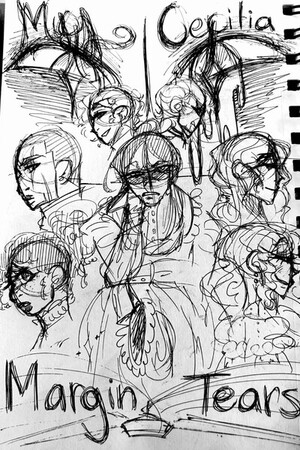Chapter 31:
An Absolute Ball
Margin Tears: My Cecilia
The evening fell in what fell like a snap—And in some way, it probably was. The ballroom glittered with chandeliers and restless laughter. Violins sawed their way through waltzes while silk gowns swept the polished floors, and the grand old manor seemed, for one evening, less a mausoleum of shadows and more a theater of brightness. Cecilia had been busy all night—offering trays, replacing emptied glasses, bowing politely when spoken to but never lingering long enough to be mistaken for part of the revelry. Her hands smelled faintly of citrus from the punch she had carried earlier, and her feet ached.
Glittering chandeliers, strings of pearls, velvet waistcoats, and her, the lowly maid sneaking about with a tray of champagne flutes like an underpaid moth among peacocks. It was a setup made in heaven, as it meant, naturally, that the plot had already ordained her as the night’s centerfold.
The violins swelled with suspicious eagerness, as if they had been warming up for this very cue. Guests parted as though shoved by invisible hands, leaving Cecilia stranded in a beam of light directly across from Lord Orlin. He stood there, cloak brooding, eyes smoldering like someone had applied too much kohl.
Oh, by all the gods on Olympus, no! Not the “forbidden dance” trope!
“Dance with me,” he said, extending a gloved hand. Not may I have this dance, but dance with me, as though the illusion of choice had dissipated entirely, leaving only a straightforward command.
She laughed—high, nervous, and very nasal. “Oh, I don’t dance. I trip in time to music. It’s a different art form entirely.”
The violins ignored her and struck up a passionate waltz, making Cecilia glare into the air. He stepped closer. “Do not deny what we both feel.”
“Denial is my specialty,” she said with a tight smile, sidestepping. “I deny chamber pots smell bad, deny laundry days exist, deny gravity—”
At that exact moment, she tripped over her own hem and landed squarely on his boots.
The crowd gasped. The story rejoiced. It was perfect! The clumsy-but-endearing stumble, the lord’s arms sweeping her into place, the forbidden dance born of accident—Absolutely ideal!
Except Cecillia was fully committed to the clumsy stumble bit.
“Whoops!” she hollered, seizing both his hands and whirling him into a spin so violent he nearly clotheslined a dowager duchess.
“Good heavens!” someone cried.
“What can I say—I’m simply a mess!” she shouted back, dragging Olrin through what could only be described as interpretive wrestling. His cloak got tangled with my apron strings. A footman screamed as we plowed through the canapé table.
The violins tried desperately to keep pace, skittering up and down scales like squirrels on fire.
“You are—ruining—everything—!” the lord hissed, breathless as she yanked him into a dip that left him bent backward over a horrified baron.
“Oh, don’t be dramatic,” she said. “Just look, my lord—” She nodded toward the crowd. “They’re loving it!”
Indeed, a small group of drunken guests had formed a circle, cheering as she spun them into a grotesque parody of ballroom grace. At one point she attempted a lift, which resulted in her dropping him onto a pile of profiteroles. Whipped cream smeared across his noble jaw.
The violins gave up entirely, leaving only what remained of the confused symphony orchestra to try to form music that fit the absolute mess left of the dancefloor. The two protagonists, along with the surprisingly easily swayed faceless crowd, could only stagger in uneven rhythm, half-waltz, half-barn dance, and entirely catastrophic.
At last, sweaty and sugar-coated, the lord wrenched free. “You make a mockery of your destiny!” he spat.
She scoffed, hands on hips as she spat, “My destiny is mine to make! And if I want it alone and covered in frosting, that is my choice!”
The crowd erupted into drunken applause. Someone threw a shrimp. Handfuls of couples broke into chaotic spinning dances of their own as the ball truly did become one in its most hazardous sense, the entire ballroom becoming a war zone. Candles sputtered, crystal shards littered the floor, and guests shrieked with a mixture of fear, rage, and amusement. Cecilia, half-drenched in wine and custard, skirts torn to near indecency, realized something vital.
The narrator was overconfident, overconfident enough to think she could not fight back.
The violins wailed as the lord extended his hand toward her again, cloak swirling perfectly as though he were carved from the story itself. Cecilia grabbed a handful of pastry from the floor and flung it into his face. The custard hit with a satisfying splat, dripping down his chin. The narrator recoiled in irritation. Not allowed, he hissed in the edges of her consciousness.
Cecilia smiled. Victory—small, messy, and sticky—was hers.
The chandelier swayed, threatening to collapse again. The story tried to force her under it, but Cecilia jumped sideways, catching herself on a table, sending a tray of flutes clattering to the floor. Wine spilled everywhere, including, conveniently, on the lord’s boots. He growled in indignation, but she was already moving.
She ran through the chaos, gathering momentum and objects as she went. A candlestick became a makeshift staff. A platter of grapes became ammunition. Every misstep, every spill, every collision—she weaponized them against the narrative itself.
The narrator hissed, trying to correct the scene. No! You cannot defy the choreography! The lord’s arms are scripted to catch you! The wine is meant to stain only your skirts!
Cecilia grinned. “Watch me.”
She tripped deliberately—no, strategically—toward the orchestra pit, sending sheet music fluttering into the air. The musicians scattered, dragging instruments with them, shrieking as violins collided with harps. The music screeched, chaotic, broken. The carefully orchestrated waltz was ruined. The lord flailed, cape snagged on a chair, glowering with perfect narrative indignation.
A silver tray of pastries became her next ally. She hurled éclairs and tarts, knocking over guests in a perfect domino of aristocratic indignity. The crowd shrieked and fled, leaving only the lord and a very angry narrator.
You think you can sabotage me? the narrator hissed, venomous. You are mine!
“Then let’s test that,” Cecilia said, spinning into a low dip. The lord’s hands shot out instinctively, but she twisted out of reach, elbowing him gently in the ribs. He yelped, stumbling into a fountain of punch, splashing the remaining guests.
Cecilia’s laughter rang over the chaos. She snatched another candlestick, raised it high, and vaulted onto a nearby table. The story tried to pull her down, tugging at her balance with invisible strings, but she stomped down hard, scattering glass and silverware like confetti.
The lord finally lunged, but Cecilia sidestepped, kicking the hem of his cloak. It caught in a chair leg, wrapping him in a knot of fabric that left him spinning helplessly in place. The narrator shrieked—violins grinding to an unbearable, discordant halt—while Cecilia stood victorious, arms on her hips, skirts torn but spirit intact.
For the first time, she felt the thrill of leverage. She could not rewrite the story entirely—not yet—but she could interfere. Every disaster, every catastrophe, every humiliation—the narrator’s weapons—were now hers to wield against him.
She tilted her head, surveying the ruined ballroom. “Oh, narrative,” she whispered. “You think you control me. But I’ve learned your tricks. And I’m learning yours are predictable.”
Lord Olrin flailed once more, and Cecilia threw a last tart with precise aim, splatting against his chest. Every instrument groaned in protest, the chandeliers trembled, and somewhere, faintly, she could hear the narrator’s voice breaking through the chaos:
This…cannot…be happening.
Cecilia laughed, triumphant and chaotic. The ball had become her battlefield, and she would fight tooth, nail, and pastry for every step of her freedom.
Tonight, she was no longer merely the clumsy, embarrassed maid. Tonight, she was the storm!
…
…
…
Very well. Cecilia. You’d like a storm? Let us experience a storm.




Please sign in to leave a comment.